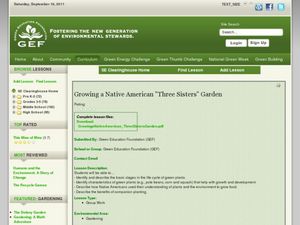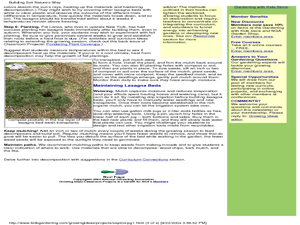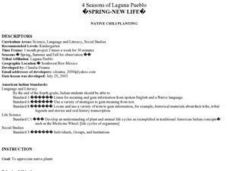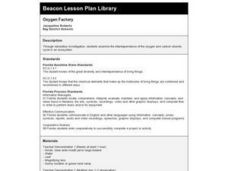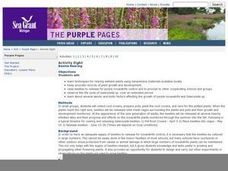Curated OER
Biodiversity in Illinois-Pond Habitats
Second graders construct a pond habitat in the classroom using a small swimming pool partially filled with water, real cattails, a tree log adjoining, and plastic animal life appropriate to a pond setting. They examine the frog in detail...
Curated OER
Where the Red Fern Grows: A 4th Grade Literary Focus Unit
Fourth graders explore the human and animal connection along with the idea that death is a part of the life cycle. They read "Where the Red Fern Grows." Students examine the feelings and emotions surrounding death and they discover the...
Curated OER
Growing a Native American "Three Sisters" Garden
Young scholars explore plant life by creating their own gardens in class. For this food growing lesson, students discuss the types of gardening methods Native Americans used in order to keep healthy. Young scholars plant corn seeds in...
Curated OER
Butterflies Crossword Puzzle
In this science worksheet, students complete a crossword puzzle by writing in words related to the life cycle of a butterfly. Students review ten vocabulary words on this worksheet.
Curated OER
Kwanzaa Science
Students study the parts of a plant in order to better understand the muhindi as one of the seven symbols of Kwanzaa.
Curated OER
Gametogenesis and Fertilization
High schoolers explore how this module focuses on part of the cycle of alternation of generations: meiosis to produce haploid spores and fertilization to produce a diploid zygote which grows into the adult plant.
Biology Junction
Introduction to Plants
In this biology lesson, learners identify the different types and parts of the plant. They complete a crossword puzzle with 37 questions about plants.
Curated OER
How Does Your Garden Grow?
Students discover gardening by documenting plants grown on school grounds. In this botany lesson, students utilize digital cameras to capture images of plants on photo hikes which are turned into a slide show. Students plant a garden...
Curated OER
A Seed Dispersal Investigation
Students investigate the function and purpose of seed dispersal. In this garden lesson, students examine the importance of wind in the plant cycle. Students construct a flying seed model from an attached design and discuss if it can be...
Curated OER
Introduce Vocabulary: A Day at the Apple Orchard (Faulkner and Krawsky)
If your class is reading A Day at the Apple Orchard by Megan Faulkner, be sure to use this guide for vocabulary in context. Go over the orchard-related terms (cycle, harvest, orchard, pollen, and ripen) before reading the story aloud....
Curated OER
Building Soil Nature's Way: Exploring decomposition and soil health
Students explore decomposition and soil health by creating their own garden. In this agriculture lesson, students build a "lasagna garden" with organic matter found in the area and plant perennials native to their region. Students are...
Mr. E. Science
Erosion and Deposition
Get an in-depth look into erosion and deposition with a 23-slide presentation that details how gravity, water, waves, wind, and glaciers cause changes to the Earth's surface. Each slide consists of detailed images equipped with labels,...
Core Knowledge Foundation
A Time for All Seasons - Fall
The weather is cooling down and the leaves are starting to change color; fall is right around the corner. Celebrate this special time of year with this earth and life science lesson series that teaches children about the causes of...
Desert Museum
Daisy Ecology
Here's a fine lesson that combines poetry with life sciences. Learners carefully listen to a poem that's all about a food chain. As the poem is read, learners name the producer, the herbivore, the carnivore, and the omnivore. Lots of...
Curated OER
Flutterings and Flowers
Fourth graders investigate the significance of natural resources and the habitats of butterflies. They create a list of their own favorite foods, then watch a video about habitats. Students identify things in the video that animals and...
California State Parks
Energy Flow Through an Ecosystem
One of the key concepts in life science and biology is the cycling of energy throughout an ecosystem. Learners can take notes on the topic using the vocabulary included within the presentation. From producers making their own food...
Curated OER
Native Chili Planting
Students discover the process of planting chili. After comparing two types of seeds students plant and with the use of a digital camera, record the seed progress. When ready for transplant, students take young plants to a retirement...
Curated OER
Fresh or Salty?
Students explore water bodies on the planet Earth and their various uses and qualities. They examine several ways that engineers are working to maintain and conserve water sources and think about their role in water conservation....
Curated OER
Seed Diversity
Students explore agriculture by researching different seeds. In this seed identification instructional activity, students collaborate in small groups to analyze a package of different seeds. Students utilize a magnifying glass to examine...
Curated OER
Oxygen Factory
Fourth graders examine the interdependence of the oxygen and carbon dioxide cycle in an ecosystem through a laboratory investigation. After a lecture/demo, 4th graders complete the lab in groups.
Curated OER
The Cell - Internet Activity
For this cells worksheet, students click on the links to learn about the plant and animal cells complete a comparison chart and answer short answer questions about it. Students complete 10 questions total.
Curated OER
Index of Organisms
In this biology worksheet, students fill in the description of a plant or animal. They write answers to 8 blanks and draw the organism's life cycle diagram.
Curated OER
The Alphabet Garden
Third graders transplant, tend and observe a plant for each letter of the alphabet in a school garden. They work individually to research and select a plant that will grow in their local climate. Students then care for and observe the...
Curated OER
Beetle Rearing
Students investigate plants and the effects beetles have on the plants. In small groups, they collect plants and observe the beetles as they interact with the plants. They record the conditions including temperature, cloudiness, length...




